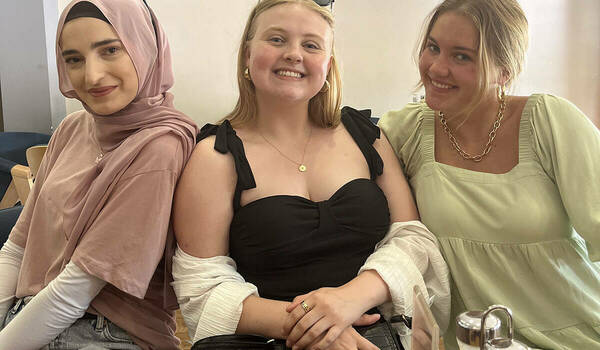
Allison Sharp is a rising senior at the University of Notre Dame, where she majors in Political Science and minors in European Studies.
I applied to Notre Dame’s faculty-led trip to Bosnia and Herzegovina this summer because I wanted to learn more about a part of Europe that is often left out of history books and course syllabi. I wanted to educate myself on the rich history of the country, and the current situation in regards to peacebuilding. This trip did help me accomplish those goals, but the most impactful part of the journey was actually a conversation about my own country.
I had been planning on permanently leaving the United States since February 14, 2018—the day of the Stoneman Douglas High School shooting in Parkland, Fla. I had been worried about my own country for a while, having grown up with Virginia Tech, Aurora, and Sandy Hook, but on that day, I lost all hope for a future here. I decided that I would finish high school, get my bachelor’s degree in the United States, and then move to Europe for a master’s program. Up until my trip to Bosnia and Herzegovina, this was still my plan. And since I had made my decision to leave in 2018, things in my country had gotten only worse.
But back to the trip. On our first day with the local students, we were given a presentation by Ahmet Alibašić, a professor at the University of Sarajevo’s Faculty of Islamic Studies. Professor Alibašić discussed “The Place of the Other in Islam.” He explained how classical Islamic sources and laws allow for coexistence between Muslims and non-Muslims. Professor Alibašić emphasized that having conversations with people from different backgrounds is key to building peace and fostering mutual understanding. Before the Bosnian War, Professor Alibašić served in the Yugoslav Army, and he said if he had been told five years before that the country would be at war, he would not have believed it. He warned us American students that this same violence could happen in our country. Sadly, we didn’t need to be warned. We had already been seeing violence and hatred for years.
I asked Professor Alibašić how you can have conversations with the other to bridge the gap between the two of you when the other won’t even talk to you. How can you do these things to try to make progress when everything you do seems so fruitless? Professor Alibašić replied that all you can do is try to find little things to connect with people on, and to build off of that. He explained that peacebuilding is not a quick process. Amra Pandžo, one of the local peacebuilders that had been accompanying us on our trip, then said something that completely changed my view on my country and my future. She shared that having those conversations and attempting to build peace may very well not accomplish anything. What matters, she insisted, is being able to say that you tried.
Amra’s words that day made me begin questioning my plans for the future. I wondered if I should at least try to make things better at home, rather than just run away. This is something that I’m still torn about. The day after the presentation with Professor Alibašić, I got a notification on my phone saying that there had been a shooting at Robb Elementary School in Uvalde, Texas, killing nineteen students and two teachers and wounding seventeen other people. In that moment, I felt hopelessness creep back up inside of me. Today, though, as I write this reflection on my time in Bosnia and Herzegovina, I’m thinking about the importance of trying. I know that it won’t be easy, but it also hasn’t been easy for Amra and her colleagues—and yet, they continue to do their work day in and day out.
My trip to Bosnia and Herzegovina was life-changing for me in many ways. I made lifelong friends, learned about peacebuilding and interfaith dialogue from the experts, and had a realization about peacebuilding in my own country. I can’t wait to return to this beautiful and perplexing country, one that has taught me so much, led me to important questions, and helped me grow as I process the challenges my own country faces.
Originally published by at ansari.nd.edu on June 13, 2022.